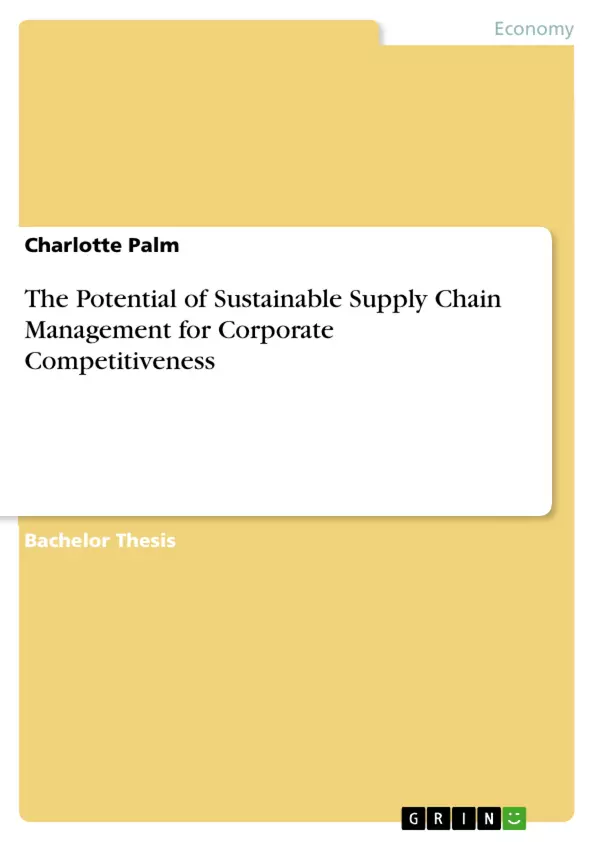The purpose of this paper is to answer this question: How great is the potential of sustainable supply chain management (SSCM) to impact a firm‘s competitiveness? In other words, can it be considered as something a firm can implement to influence their competitiveness and if so in which way and strength?
To assess this, first a theoretical background will be given on SSCM as well as a definition for the underlying concept of competitiveness for this thesis in chapter 2. In chapter 3 an overview of practices that can be accounted to SSCM will be outlined and complemented by research findings that cover the influence of SSCM practices on corporate competitiveness. Factors that are also of relevance to ultimately determine the potential of SSCM shall be included as well. To this theoretical perspective the examination of two practical examples shall be added in chapter 4 in order to be able to discuss the magnitude of SSCM’s potential to impact corporate competitiveness in chapter 5. Finally, concluding remarks, the final answer to the initial question as well as an outlook for the future development will be given in chapter 6.
Sustainable supply chain management (SSCM) is a growing field of research as well as already implemented by several firms. In order to help a firm determine if SSCM should be considered as something to implement the question shall be answered if and in which magnitude SSCM holds potential for a firm’s competitiveness. Competitiveness is deter-mined by the chosen sources of cost savings, image and customer loyalty as well as human resources and innovation. Through a review of literature existing influences of SSCM practices on competitiveness have been collected and other factors to consider determined. Two practical examples are also given. Two main findings have been made: Mainly positive influences of SSCM practices on defined sources of competitiveness could be found; hence potential of SSCM for corporate competitiveness exists. Taken into consideration the aforementioned factors SSCM’s potential for corporate competitiveness is high, if SSCM itself is successfully implemented, if the firm acts as first mover and if it acts now.
Inhaltsverzeichnis (Table of Contents)
- 1 Introduction
- 2 Theoretical Background
- 2.1 SSCM Definition
- 2.2 Concept of Competitiveness
- 3 Impact of SSCM Practices on Competitiveness – Theoretical Perspective
- 3.1 Triggers and Relevance of SSCM
- 3.2 Overview of SSCM Practices
- 3.2.1 Internal Practices
- 3.2.2 Practices along the Supply Chain
- 3.3 Influence of SSCM Practices on Sources of Competitiveness
- 3.3.1 Cost Savings
- 3.3.2 Image and Customer Loyalty
- 3.3.3 Human Resources and Innovation
- 3.3.4 Covering multiple Sources of Competitiveness
- 3.4 Factors that influence the Potential of SSCM Practices
- 3.4.1 Focal Firm Factors
- 3.4.2 External Factors
- 4 Impact of SSCM Practices on Competitiveness – Practical Perspective
- 4.1 Nike
- 4.2 Scandic Hotels
- 5 Discussion
Zielsetzung und Themenschwerpunkte (Objectives and Key Themes)
This paper explores the potential of Sustainable Supply Chain Management (SSCM) to impact a firm's competitiveness. It aims to determine if and how SSCM can be used as a tool to enhance a company's standing in the market. The paper examines SSCM practices and their influence on various sources of competitiveness, such as cost savings, customer loyalty, and human resource management.
- The connection between SSCM and corporate competitiveness.
- The influence of SSCM practices on various sources of competitiveness.
- Factors that determine the potential of SSCM practices for a firm.
- Practical examples of how SSCM has been implemented by successful firms.
- The future development of SSCM and its impact on corporate competitiveness.
Zusammenfassung der Kapitel (Chapter Summaries)
The introduction sets the stage for the research by highlighting the growing relevance of SSCM in today's business environment, and the need to understand its impact on competitiveness. Chapter 2 lays the groundwork by providing a definition of SSCM and outlining the concept of competitiveness. Chapter 3 delves into the theoretical perspective, exploring the influence of SSCM practices on various sources of competitiveness, including cost savings, image and customer loyalty, and human resources. It also discusses factors influencing the potential of SSCM, such as focal firm factors and external factors.
Schlüsselwörter (Keywords)
Sustainable Supply Chain Management (SSCM), Corporate Competitiveness, Cost Savings, Customer Loyalty, Human Resources, Innovation, Focal Firm Factors, External Factors.
Frequently Asked Questions
How does Sustainable Supply Chain Management (SSCM) affect corporate competitiveness?
SSCM impacts competitiveness through cost savings, improved brand image, increased customer loyalty, and fostering innovation and human resource efficiency.
What are the internal practices of SSCM?
Internal practices include implementing environmental management systems, sustainable product design, and corporate social responsibility (CSR) initiatives within the focal firm.
Which external factors influence the potential of SSCM?
External factors include regulatory requirements, pressure from NGOs and stakeholders, market demand for sustainable products, and the behavior of competitors.
Can you provide examples of firms successfully implementing SSCM?
The paper highlights Nike and Scandic Hotels as practical examples of companies that have integrated sustainability into their supply chains to enhance market standing.
Is being a 'first mover' important in SSCM?
Yes, acting as a first mover allows a firm to set industry standards and capture the high potential for competitiveness before sustainable practices become a baseline market requirement.
- Citar trabajo
- Charlotte Palm (Autor), 2016, The Potential of Sustainable Supply Chain Management for Corporate Competitiveness, Múnich, GRIN Verlag, https://www.grin.com/document/376867



